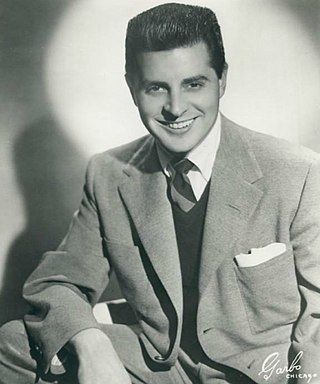"Something's Gotta Give" is a popular song with words and music by Johnny Mercer in 1954. It was published in 1955. It was written for and first performed by Fred Astaire in the 1955 musical film Daddy Long Legs, and was nominated for an Academy Award in 1955 as Best Original Song, losing to "Love is a Many Splendored Thing" from the film of the same name.
"Ricochet" is a popular song. The credits show it to be written by Larry Coleman, Joe Darion, and Norman Gimbel, without apportioning the work on the lyrics and music, in 1953. In fact, since Coleman and Darion wrote "Changing Partners" the same year, with Darion as lyricist and Coleman as composer, while Gimbel wrote the English lyric for "Sway" the same year, it can be concluded that Coleman wrote the music and Darion and Gimbel the lyrics.
"Too Young" is a popular song, with music written by Sidney Lippman and lyrics by Sylvia Dee. A recording of the song was released by Nat King Cole in 1951, which reached No. 1 in the United States and became the best-selling song of the year. The song was an early attempt by music labels to appeal to the younger demographics and its success later led to a boom of music that caters to the young. Another successful version was released by Donny Osmond in 1972.
"A Bushel and a Peck" is a popular song written by Frank Loesser and published in 1950. The song was introduced in the Broadway musical Guys and Dolls, which opened at the 46th Street Theater on November 24, 1950. It was performed on stage by Vivian Blaine and a women's chorus as a nightclub act at the Hot Box. It is the first of two nightclub performances in the musical. Although Blaine later reprised her role as Miss Adelaide in the 1955 film version of the play, "A Bushel and a Peck" was omitted from the film and replaced by a new song, "Pet Me, Poppa."

Johnny Desmond was an American singer who was popular in the 1940s, 1950s and 1960s.
"Pretend" is a popular song, written in 1952 by Dan Belloc, Lew Douglas, Cliff Parman and Frank Levere.
"Anema e core" is a popular song.

"Vaya con Dios (May God Be With You)" (, literally "Go with God") is a popular song written by Larry Russell, Inez James, and Buddy Pepper, and first recorded by Anita O'Day in December 1952. Les Paul and Mary Ford had a No. 1 recording of the song in 1953. Members of the Western Writers of America chose it as one of the Top 100 Western songs of all time.

Eileen Barton was an American singer best known for her 1950 hit song, "If I Knew You Were Comin' I'd've Baked a Cake."
Joan Regan was an English traditional pop music singer, popular during the 1950s and early 1960s.
"Open Up Your Heart (And Let the Sunshine In)" (sometimes seen as "And Let the Sun Shine In") is a popular song written by Stuart Hamblen and first published in 1954.

"Sugartime" is a popular song written by Charlie Phillips and Odis Echols, and published in 1957. The biggest hit version was by the McGuire Sisters, whose recording of it topped the Most Played chart in February 1958. It was also the second number 1 Billboard single for the trio after 1954's "Sincerely". The song refers to the Jimmie Rodgers tune "Honeycomb", which had been recorded a few months earlier in 1957.
"I'm Old Fashioned" is a 1942 song composed by Jerome Kern, with lyrics written by Johnny Mercer.
(My Baby Don't Love Me) No More" is a popular song.
"Release Me", is a popular song written by Eddie "Piano" Miller and Robert Yount in 1949. Four years later it was recorded by Jimmy Heap & the Melody Masters, and with even better success by Patti Page (1954), Ray Price (1954), and Kitty Wells (1954). Jivin' Gene [Bourgeois] & the Jokers recorded the tune in 1960, and that version served as an inspiration for Little Esther Phillips, who reached number one on the R&B chart and number eight on the pop chart with her big-selling cover. The Everly Brothers followed in 1963, along with Lucille Starr including a translation in French (1964), Jerry Wallace (1966), Dean Martin (1967), Engelbert Humperdinck (1967) who was number one on the UK Singles Chart and many others in the years after such as Jewels Renauld (2022).
"May You Always" is a popular song by Larry Markes (lyrics) and Dick Charles, published in 1958.
Johnny Douglas was an English composer, pianist, musical director, conductor, and string arranger primarily working with film scores and orchestras. He recorded more 500 tracks for Decca Records, over 80 albums for RCA Records, and provided music for 36 films during his career. He was nominated for a BAFTA for his soundtrack for the 1970 film The Railway Children and led RCA'S Living Strings for many years. In addition to films, Douglas composed and conducted music for television series including Spider-Man and His Amazing Friends, Dungeons & Dragons, The Incredible Hulk, G.I. Joe: A Real American Hero, and The Transformers.



